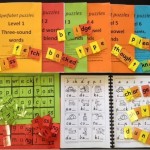Getting kids’ cooperation
0 Replies
Many parents of children and adolescents who are struggling with reading and/or spelling would like to help their child with literacy.
However, they often report that their child refuses to do any work with them, and will only work for other people.
Juggling two roles – that of parent and teacher – can be very tricky, especially when struggling learners can become pretty tense and thin-skinned at the very mention of reading or spelling.
How to talk so kids will listen, and listen so kids will talk
One of the best books I've ever read about how to get kids' cooperation, and about emotional intelligence generally, is a classic, cheap paperback called "How to talk so kids will listen, and listen so kids will talk", by Adele Faber and Elaine Mazlish.
I think I learnt at least as much from this book about managing children's moods and behaviour, and getting them to do my work, as I did at university.
I often lend or recommend this book to parents who report friction and non-cooperation at home, when it seems like no speech therapy homework is going to be able to be done unless the parent adopts some new tactics.
It's a completely easy book to read because about half of it is cartoons like the one above, which illustrate unhelpful strategies that parents and others often use (many of them very familiar), and alternative, more helpful strategies to try.
For example, its first chapter is called "Helping Children Deal With Their Feelings", about the importance of acknowledging and accepting children's feelings, without judging them.
"This work is boring and stupid, and not helping me"
I used to take it pretty personally and literally when children said things like "I don't want to do this work" or "This is boring, can't we play games?". Then I read Faber and Mazlish. Kids whine all the time, and they like playing more than working. Big deal.
Now when kids make these complaints, I say (thanks to Faber and Mazlish), "You're sick of doing this work, you're finding it boring, and you'd rather play a game," and then I stop talking.
The kid then often looks at me in surprise. An adult that heard them say something negative, and didn't lecture or contradict them!
Their next move is often something like, "Can we just finish this page?" or "How many more minutes?" or "When we're finished this, can we play that game?".
That is, being heard and understood seemed to help them cope with their negative feelings and calm them down (don't we all want this?), and they don't usually try to press their advantage and stop working straight away, they just try to negotiate a close to the current activity. Which I think is fair enough.
Denying kids' feelings just makes them confused and angry, so if a child says something like, "I'm not doing this stupid work, it's not even helping me!", please do not contradict them, or tell them the work is good for them, or accuse them of being ungrateful for the extra time and effort you're putting into trying to help them.
Perhaps the most useful thing you can say is, "You think doing this work is just a great big waste of time", and wait for them to realise you're not shocked or angry, and to start to manage their feelings themselves, and prepare to negotiate a reasonable compromise.
Other useful kid-wrangling ideas, clearly and simply presented
The remaining chapters of this book are called:
- Engaging Cooperation
- Alternatives to Punishment
- Encouraging Autonomy
- Praise
- Freeing Children from Playing Roles
- Putting It All Together
My copy then has an afterword, as it's about the millionth edition – it was first published in 1980 and my edition is dated 1999 – and a reading list.
This book didn't sell about a million copies for nothing, so if you're having difficulty getting a learner's cooperation over doing work on their literacy, whether at home, school or elsewhere, I highly recommend it as a source of useful tactics.



Leave a Reply